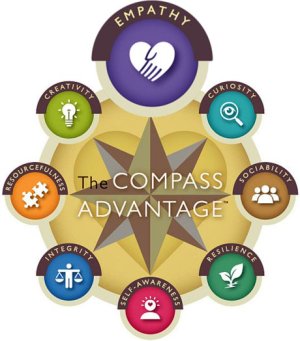Empathy in Action: How Teachers Prepare Future Citizens
Teachers are uniquely positioned to teach empathy, which will help children not only discover personal success, but also contribute to the betterment of society.
Your content has been saved!
Go to My Saved Content.How do children learn to care enough about others that they reap the personal rewards associated with giving? When young people develop empathy, they not only thrive in school and life, but they also impact their communities in positive, often extraordinary ways.
Individual and societal success depends on raising and educating children who care about others. But we have misled today's children to believe that success is achieved through test scores, material wealth, and personal gain. In turn, there has been a measurable shift toward self-centeredness at a time when society depends more, not less, on people who give of themselves.
Developed through emotional attachment with other human beings, empathy is our ability to recognize, feel, and respond to the needs and suffering of other people. While the digital age has given children more ways than ever before to connect with others, many researchers are concerned with how social networking and decreased face-to-face relationships may have contributed to a 48 percent drop in empathetic concern for others over the past few decades. Studies have linked low empathy to increased bullying, narcissism, rigid belief systems, and civic apathy. As educators, we have a moral imperative to rethink how we teach kids to care in a more hurried, impersonal, data-driven world.
The Foundation of Caring and Engaged Citizenship
This is the last in a series of articles on how to apply eight core principles of positive youth development in the classroom using The Compass Advantage™ as an organizing framework. Empathy is situated at "true north" on the compass because it is the driver of caring and compassionate actions in the world. By developing empathy in children, teachers help them feel valued and understood while impacting social change and innovation for decades to come.

Empathy is systemically related to all of the abilities on the compass, particularly to self-awareness at "true south." Research suggests that the more children become aware of themselves, the better they become at understanding others. Volumes have been written about how to teach empathy, and there is still much to learn. In an excellent article from the Greater Good Science Center at the University of California, Berkeley, author Roman Krznaric, Ph.D., claims that highly empathetic people:
- Cultivate curiosity about strangers
- Challenge prejudices and discover commonalities
- Gain direct experience of other people's lives
- Listen and open themselves to others
- Inspire mass action and social change
- Develop an ambitious imagination
All of these behaviors foster personal growth and lifelong learning while contributing to the growth of society, particularly empathy's role in inspiring social change. As William Deresiewicz underscored in his recent book, Excellent Sheep: The Miseducation of the American Elite and the Way to a Meaningful Life, the goal of education should always be "to leverage learning as an agent of social change -- the kind of objective that makes leadership and citizenship into something more than pretty words."
This post focuses on the intersection of empathy and citizenship, an area of research that I have pursued for almost a decade and the topic of my book, Tomorrow’s Change Makers: Reclaiming the Power of Citizenship for a New Generation. In-depth interviews with students who became engaged in social and environmental causes in middle and high school showed that each was motivated to serve the greater good through an ability to empathize with individuals and feel compassion for victimized, oppressed, and marginalized groups. The six habits below derive from my research with students who spoke about how their greatest teachers not only fostered empathy, but also inspired them to put empathy into action in the world.
6 Empathy-Building Habits of Great Teachers
1. Create meaningful relationships with students.
For children to develop the capacity to feel empathy for others, they must feel seen, felt, and understood regardless of how they learn. Teachers who know, appreciate, and respect students beyond academics help children feel cared for and increase their ability to care for others.
2. Nurture children's self-efficacy through mentoring.
Young people who transform empathy into community action attribute mentoring by teachers among the primary reasons that they developed a belief in self. Without this sense of self-efficacy, students claim they would not have come to believe that they could help others or change the world. According to students, teachers fostered self-efficacy by:
- Supporting and encouraging
- Listening
- Setting high expectations
- Showing interest in students as individuals
- Fostering decision-making skills
- Providing another perspective during problem solving
3. Teach values associated with good citizenship.
Teachers who emphasize caring, cooperation, compassion, kindness, service, teamwork, and the importance of getting along with classmates are powerful empathy builders. From elementary through high school, children should evolve through three developmental stages as they take on roles in society:
- Being responsible citizens
- Improving their communities
- Contributing to solve societal problems
These civic roles are intertwined with developing empathy.
4. Inspire students to become their best selves.
Ryan, a volunteer making a difference in Boston's Chinatown, said of his teachers, "The fact that they are so dedicated to teaching, helping, and empowering students . . . that's such a meaningful gesture. They are always trying to give back to the next generation. That really inspires me." Most students who developed high levels of empathy named teachers as their primary role models. They learned to become their best selves from teachers who exemplified the following traits:
- Passion and ability to inspire
- Clear and articulated set of values
- Commitment to community
- Selflessness
- Ability to overcome obstacles in life
5. Expose students to different opinions and worldviews.
When teachers cultivate curiosity about how individuals and groups of people see the world differently, they expand children's intellectual, interpersonal, and emotional boundaries. They help students see and understand differing perspectives. When challenged to explore prejudices, find commonalities, and glean meaning from what they imagine life would be like walking in another person's shoes, students build a greater capacity for empathy.
6. Link curriculum to real-world service activities.
Teachers who weave meaningful service learning into their classrooms help students turn empathy into action by building skills in critical thinking, planning, organizing, and problem solving. Youth gain the most from service projects that push them out of their emotional comfort zones and allow them to see the world differently. For example, when Danielle participated in a geography class project that teamed up with Heifer International, it ignited a passion for environmental stewardship. She said, "It changed the way I saw service from something you did on the side when you had time, to a lifestyle."
Call to Action
As educators, we must offer core principles that inspire teachers, parents, and communities to move beyond modern notions of success -- to instill abilities that matter most for healthy youth development. We must bring attention to the relationships and experiences that shape the caring, curious, sociable, resilient, self-aware, honest, resourceful, and innovative adults that all youth are capable of becoming. When children chart their own paths through life with empathy at "true north," they not only discover personal success, but also contribute to the betterment of society.
